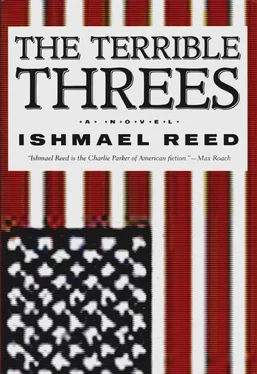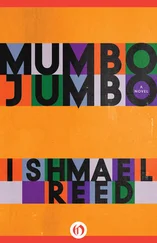“You remember all of the promise you had before you came to Hollywood? Man, jazz needs good composers, and you were one.”
Black Peter threw another image upon the screen. A scene inside one of those cheap funeral homes. The scene was holographic and Peter and Fryer Moog entered. They walked down the aisle and looked into the coffin. It was Fryer Moog. An old woman was the lone mourner. Her face was covered with a veil. She lifted the veil. It was his mother. Moog woke up screaming.
The New York literary crowd had turned out at the Algonquin to Cedric Longsfellow’s farewell party (that wasn’t his real name). But though he was the guest of honor, he stood in the middle of the room, ignored. Everybody surrounded Beechiko Mizuni, author of a new book that all of the critics were raving about: Intervention or Internment . The book, dedicated to all of the G.I.’s who guarded the Japanese Americans at Tule Lake, proposed that the American army had rescued Japanese-American women from the misogyny of Japanese-American men by placing them in the internment camps. She said that Japanese-American men who wrote fiction and nonfiction complaining about the internment experience were perfectly willing to indict the racism of the white soldiers but were not willing to face their own evil, their misogyny. She got her face on the cover of a big magazine, Sister . She was on the talk shows, and there was a big fight between Okra Hippo and Virginia over who would have her on which show. Okra won out, because her show had the biggest budget, and also, it could be added, the biggest tits, a fact that wasn’t lost on Mr. Whyte, producer of “Whyte B.C.” It was said that on an especially windy New York day, she had to be held down for fear that she might float off somewhere, her tits were so big. Beechiko said that the internment provided her with the best years of her life; her Japanese male critics’ criticisms were traced to jealousy. They were accused of temper tantrum throwing. James Globe, the new editor of Organic Society , a magazine that Cedric Longsfellow had founded in the 1940s, had been brought in to manage the magazine by its new owners, the Slutts, a Midwest family that had made its fortune in mattresses. They too wanted to make Chicago the Athens of America. Globe was a member of the National Critics Society and had already nominated Beechiko Mizuni for a Book Award. He was dressed all in black leather and his Harley Davidson was parked outside. Nobody noticed Longsfellow when he went to the cloakroom. He was about to leave when Beechiko approached him, after breaking through the circle of her well-wishers.
“Mr. Longsfellow, please wait.”
“O, Beechiko,” he said, putting his arm about her tiny waist.
“Mr. Longsfellow, I apologize for the way you were treated.”
“The crude way they fired me, don’t worry, Beechiko, it’s just the sign of the times. Everything, values, culture, are oozing back into the primeval slime. People hate excellence. Well-rounded characters. Characters that you can feel for, sympathize with.”
“You know how much I agree with you, Mr. Longsfellow. I, too, like characters who come alive on paper. Books with a beginning, middle, and an end. I learned all of this working under you. These people who’ve bought you out. The Slutts. They have no class, no culture. I loved that farewell piece of yours, Mr. Longsfellow. About there being no characters in contemporary literature that one could respect. I agree wholeheartedly with that, Mr. Longsfellow.” Mr. Longsfellow had been her mentor. She trusted him more than she trusted her father, a backward San Francisco realtor, who prayed to the false superstitious idols of Buddhism. She was mad at the Japanese for not producing a Tolstoy. A Rembrandt.
“Well, I must be going, Ms. Mizuni.” The people in the background were partying back. Once in a while James Globe would glance at Longsfellow, sneeringly. Longsfellow hated Globe, who’d made a career as a neoconservative hatchet man, bashing black and women’s studies. Why, the man actually believed that there were intellectuals in Chicago! Must be some move on his part to get a grant, Longsfellow thought. Today’s generation was so market oriented. Cared little about aesthetics. He was attending parties with Sartre and Simone de Beauvoir when James Globe was in grammar school. Mr. Longsfellow headed out of the Algonquin and into the snowy New York streets. A young blonde, sables around her ankles, was holding up her date, a man dressed in a smart camel’s hair overcoat and white scarf; he was wearing a tuxedo and black shoes, and was trying to blow on a party horn. Down the block Longsfellow could see a homeless person wrapped up in bundles, crouched in the doorway of a dilapidated hotel.
“Mr. Longsfellow, please wait.” Beechiko had followed him out of the hotel.
“Yes, Ms. Mizuni.” For Mr. Longsfellow it was an effort to get the words out. He preferred Mrs. and Miss.
“I … didn’t want to tell you this, but I’ve quit Organic Society magazine. I just don’t want to stay on without your editorial guidance. I just received a one hundred thousand dollar advance to do a book on Japanese-American male chauvinism. You know, their Samurai Complex. I won’t be working on it all of the time, and so I was wondering, since your wife died and all, maybe — maybe I could work for you?”
“But I couldn’t afford — I mean, the Slutts may be unscrupulous dilettantes but they gave me a price for the magazine that should enable me to continue living the kind of life I’m accustomed to. I don’t think I can afford your services.”
“I’ll do it for free,” Beechiko said. “For you, Mr. Longsfellow, I’ll do it for free.”
Mr. Longsfellow was so touched that he almost cried. He embraced Beechiko, laying his head on her shoulder. She ran her fingers across the back of his neck. Under a lamppost near the end of the corner, a group of carolers began to assemble. The Salvation Army trumpet started up: “Joy to the World.”
It didn’t take long for Beechiko to establish herself in Longsfellow’s Greenwich Village four-story brownstone. She supervised the housecleaning, which was done by Samantha and Teddy Crawford, a black couple from Saint Albans. She nearly drove them crazy. Pointing out dust under the bed, and on the living room furniture they’d missed. Demanding that they clean the stove every week. Insisting that they do windows. Sometimes she would entertain Mr. Longsfellow’s guests after they’d had their brandy and conversation, usually dealing with the lowering of cultural standards in the United States, or as one of their intellectual heroes said, the descent into the primeval slime. She would sing ancient songs accompanying herself on the koto, and for very special occasions she would entertain Mr. Longsfellow’s gentlemen friends with Shirabyoshi dances which dated to the reign of the Emperor Toba (1107–1123). The men would applaud politely and Beechiko would serve the white men tea. She was happy serving Mr. Longsfellow and writing, in the evening, her second book about the treatment of Japanese women in the novels of Japanese men. Having indicted most of the Japanese male writers in history, she was completing her last chapter on sexism. Her first book was receiving good reviews. The publisher had hailed it as a New Year’s Eve for Japanese-American women, and the Japanese men who criticized the book were dismissed as mysogynists.
Mr. Longsfellow enjoyed her too. They spent until the early mornings discussing John Updike’s theology, and V.S. Naipaul’s trenchant comments about the Third World. She was having the time of her life except for two things. Her appearance. She’d tried to do something about her eyes, you know, well, to make them more modern. She hated what for her was an ugly Japanese face. But that didn’t bother her as much as the fact that she wasn’t a blonde. Another famous editor she’d had a crush on had already run away with a big old blonde. Mr. Longsfellow had married a blonde shiksa too. His first wife gazed down at her from an oil portrait that hung on the wall above the staircase. She hated her features. Sometimes she’d cry herself to sleep, wishing that she was a blonde. Her second problem was the Crawfords. They were insolent. Always muttering under their breaths.
Читать дальше












